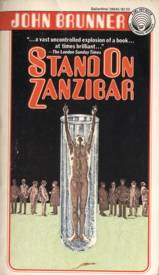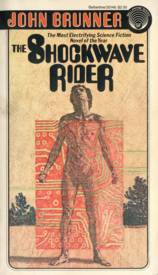

| Click on a book's image or title to order from Amazon.com |

Stand On Zanzibar
Ballantine, PB, © 1968, 650 pp, ISBN #0-345-25486-4-195Reviewed September 1997
Brunner's magnum opus is an intricate book about a near-future, overpopulated Earth. A friend of mine remarked that there's probably a good 300-page novel lurking in here somewhere, but it's hard to enjoy it when one also has to slog through the other 350 pages worth of extraneous material.
Stand On Zanzibar features a number of larger-than-life characters, including:
- Donald Hogan, a man with a vast amount of reference material in his head and Yet Another Character In SF who is draw to make highly accurate intuitive conclusions.
- Norman House, a young executive with General Technics, with an uncanny ability to move up the corporate ladder, and also a black muslim.
- Chad Mulligan, an insightful social analyst who holds the human animal in low esteem due to its compulsive need to destroy itself and its environment.
- Dr. Sugaiguntung, greatest scientist of his day, and a central figure in the rise of the smallish nation of Yatakang.
- President Zadkiel F. Obomi, president of the small African nation of Beninia, which has somehow remained independent, free, and relatively prosperous despite the utter absence of a resource base, and hostile neighbors.
Stand On Zanzibar is, primarily, a thematic pastiche. Even as the main plots are going on, Brunner focuses a huge amount of energy on chapters which do nothing but explore the nature of the world he's created, and the lives of people living in it. The primary themes involve the basic brutality of mankind (and the curious lack thereof in Beninia; Yatakang, of course, it its natural opposite) coupled with the vast overpopulation of the planet, the rationing of children performed in western nations, and the consequent selective breeding of that program. The effect is one of popular culture taken to an extreme in an effort to make society seem civilized, combined with psychotic outbreaks of people who just can't take it anymore, and decide to take a few people with them.
As an exploration of these themes - a cautionary tale, I suppose - Zanzibar works fairly well. As a dramatic piece, it falls flat, as there is way too much background and the book rarely builds up any momentum. One might occasionally giggle or gasp at a specific incident, but there's not a lot of payoff in the end, and for such a voluminous science fiction novel, the "gosh wow" factor (or "sense of wonder") is pretty low, too.

The Shockwave Rider
Ballantine, PB, © 1975, 280 pp, ISBN #0-345-24853-8-150Reviewed September 1997
Like Stand on Zanzibar, The Shockwave Rider is primarily a thematic novel; it's therefore somewhat weak on plot, and the characters exist primarily to explore the themes. Also like Stand On Zanzibar, this novel's characters are larger-than-life, possessed of skills or characteristics that make them superman, or archetypes. It lends an interesting feel to the story, in lieu of flawed, relatively normal humans with whom we can directly sympathize.
Nick Haflinger is a brilliant man who was raised by a government project at a site called Tarnover designed to harness brilliant minds to the needs of the "brain race" (the successor to the arms race in this near-future world). Haflinger escaped as a young adult, and created for himself a security code which, with the help of a network "worm" he put into the system, allows him to assume any identity he wants, and to melt into the crowd when the authorities get near to catching him. Some adept computer skills don't hurt, either. Once out, he attempts to set society straight.
"Society", in fact, is pretty messed up, with a major earthquake having decimated the west coast some decades earlier, rampaging gangs in the Midwest, and a basic realization by every citizen that there's more information out there than anyone can possibly know - or even find - and that the person next door might know some information that he can use against you, and you can't find out about it. In short, society is suffering from a strange mixture of information overload, underload, and acute paranoia.
No one has much idea of what to do about all this; indeed, a mysterious group called Hearing Aid has set up a phone number which people can dial to talk out their frustrations - they don't get counseling, they just talk to the person on the other end. Most people use this outlet to shout, curse, rage, cry, whimper, whine, and talk about suicide plans.
Along the way, Haflinger meets a woman named Kate, who proves to be "wise" in that she can sense answers to many of these problems, though she lacks the clout to do anything about it. Nick and Kate end up on the west coast in the town of Precipice, a sort of organic society which has reached a state of extreme calm - a sort of Nirvana, really. Nick and Kate hook up with them to attempt to save the world. Before the end, Nick is recaptured and interrogated by a Tarnover scientist, and Precipice's existence is threatened.
The "solution" to these problems involves the upgrade of accessibility to information for all people, and a general resolution to abolish poverty, hunger, and status-based inequality (similar to the situation in Precipice, of course). Although it sounds nice, It's hard to see that it could actually work, as the tools that Nick and company use to accomplish this are left rather abstract. The book works fairly well as an exploration of problems, but instinctively the problems seem intractable.
Ironically, where Stand on Zanzibar had very little payoff of any sort, The Shockwave Rider has a payoff but it doesn't seem quite convincing. But at least the latter book isn't 650 pages long.
hits since 13 August 2000.